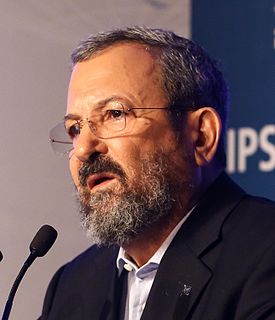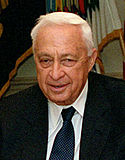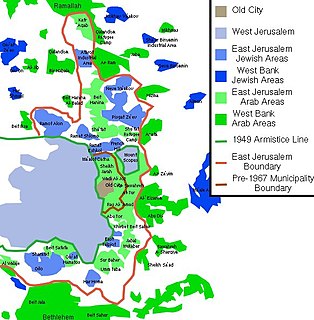| ||||||||||||||||
| ||||||||||||||||
| ||||||||||||||||
Elections for Prime Minister were held in Israel on 6 February 2001 following the resignation of the incumbent, Labour's Ehud Barak. Barak stood for re-election against Likud's Ariel Sharon.

Israel, officially the State of Israel, is a country in Western Asia, located on the southeastern shore of the Mediterranean Sea and the northern shore of the Red Sea. It has land borders with Lebanon to the north, Syria to the northeast, Jordan on the east, the Palestinian territories of the West Bank and Gaza Strip to the east and west, respectively, and Egypt to the southwest. The country contains geographically diverse features within its relatively small area. Israel's economic and technological center is Tel Aviv, while its seat of government and proclaimed capital is Jerusalem, although the state's sovereignty over Jerusalem has only partial recognition.
The Israeli Labor Party, commonly known as HaAvoda, is a social democratic and Zionist political party in Israel. The Israeli Labor Party was established in 1968 by a merger of Mapai, Ahdut HaAvoda and Rafi. Until 1977, all Israeli Prime Ministers were affiliated with the Labor movement. The current party leader and candidate for prime minister is Avi Gabbay.

Ehud Barak is an Israeli general and politician who served as the tenth Prime Minister from 1999 to 2001. He was leader of the Labor Party until January 2011. He previously held the posts of Minister of Defense and Deputy Prime Minister under Ehud Olmert and then in Benjamin Netanyahu's second government from 2007 to 2013, as he retired from politics at the end of the tenure.
Contents
- Background
- Israeli withdrawal from Lebanon
- 2000 Camp David Summit
- Second Intifada
- October 2000 events
- Results
- Aftermath
- References
- External links
It was the third and last Prime Ministerial election (separate elections were scrapped before the next Knesset elections in 2003), and the only one which was not held alongside simultaneous Knesset elections.
Voter turnout was 62.3%, the lowest turnout for any national election held in Israel. The low turnout was at least partially due to many Israeli Arabs boycotting the poll in protest at the October 2000 events in which 12 Israeli Arabs were killed by the police. [1] Other possible reasons are Sharon's massive advantage in advance polls, and the lack of enthusiasm of Barak supporters due to his perceived failings, notably, the failure of the 2000 Camp David talks with the Palestinians, and the "turbine affair" in which Barak yielded to the religious parties' pressure, violating previous promises.

Arab citizens of Israel, or Arab Israelis, are Israeli citizens who are Arab. Many Arab citizens of Israel self-identify as Palestinian and commonly self-designate themselves as Palestinian citizens of Israel or Israeli Palestinians, According to a 2017 survey, only 16% of the Arab population prefers the term "Israeli Arab", while the largest and fastest growing proportion prefers "Palestinian in Israel". A notable percentage prefers Palestinian Arab, rejecting entirely the identity of "Israeli". The traditional vernacular of most Arab citizens, irrespective of religion, is Levantine Arabic, including Lebanese Arabic in the North of Israel, Palestinian dialect of Arabic in Central Israel and Bedouin dialects across the Negev desert; having absorbed much Hebrew loanwords and phrases, the modern dialect of Arab citizens of Israel is defined by some as the Israeli Arabic dialect. Most Arab citizens of Israel are functionally bilingual, their second language being Modern Hebrew. By religious affiliation, most are Muslim, particularly of the Sunni branch of Islam. There is a significant Arab Christian minority from various denominations as well as the Druze, among other religious communities.

The October 2000 events were a series of protests in Arab cities and towns in northern Israel in October 2000 that turned violent, escalating into rioting by Israeli Arabs throughout Israel, which led to counter-rioting by Israeli Jews and clashes with the Israel Police and ending in the deaths of 13 Arab demonstrators. Most of the Israeli riots took place towards the end, between 7–9 October.

The 2000 Camp David Summit was a summit meeting at Camp David between United States president Bill Clinton, Israeli prime minister Ehud Barak and Palestinian Authority chairman Yasser Arafat. The summit took place between 11 and 25 July 2000 and was an effort to end the Israeli–Palestinian conflict. The summit ended without an agreement.




















